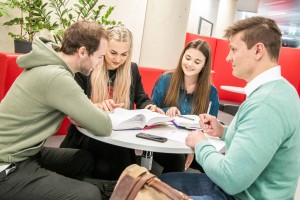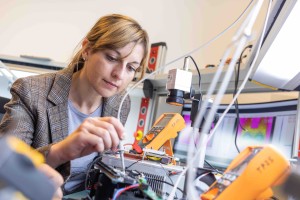In the framework of the Erasmus+ project GameHub the ZML-team organized a two days’ workshop on the topic of game based learning at FH JOANNEUM Graz. Opening the workshop Anastasia Sfiri pointed out: “we often believe that learning is serious and playing isn’t serious. Playing gives people freedom to fail, experiment and fashion identities, as well as freedom of effort and interpretation.”
Discussing definitions as play, gaming, simulation and edutainment we learnt that “to play” translates to играть (igrat' - in Russian) and грати (hraty - in Ukrainian). To connect theory with personal experience we collected games played by the participants and got a very long list starting with shooting games and sport games, to strategy and simulation games, card games and run & jump games, puzzles and so on.
Based on short inputs the participants searched for their own understanding of the learning theories behaviourism, cognitivism, constructivism, situated learning and experiential learning in Ukrainian-Russian buzz groups. After this introduction into games and learning the Ukrainians played a simple computer game, a kind of puzzle game. They downloaded it into their mobile phones or tablets and had fun in trying to understand the game, manage to succeed in the various levels and be quicker than their colleagues.
After this playing experience they were asked to reflect what happened during the game in relation to Paul Gee's principles of learning in video games. In this session we realised that an old professor really liked to play, because he continued playing under the table instead of working similar to students in class.
On the second day of the training the hands on experience on how to learn with learning games and how to design good learning games started again. This time teachers of the Ukrainian universities played the learning game Stop Disasters that is available in many languages, including Russian.
The challenge this day was to identify the learning objectives of the game and to figure out the tasks that needed to be carried out to reach these learning objectives. This learning exercise was an experiential learning approach as laid out by the learning theory. Teachers made their own experience in helping to stop a disaster and from observing and reflecting this experience they could extract the rules and the measures needed in the prevention of disasters.
One of the teachers of the workshop is coincidentally writing her PhD thesis on the topic. This is what she said about the learning experience: “I actually learned many things from the game that I can use for my thesis”. The workshop continued with a discussion about overall competences and skills acquired by playing digital games and the changing learning paradigm and role of the teachers.
At the end of the second day the ZML-team initiated the reflection of the workshop with questions in English and Russian. The experience of playing and learning was new to them and also fun. And they experienced playing – also the very simple, first game – as challenging because you have to understand the hidden rules and learn to deal with visual complexity. Together with the trainers they saw the language barrier as difficult to deal with and as challenging to find new ways of communicating.














